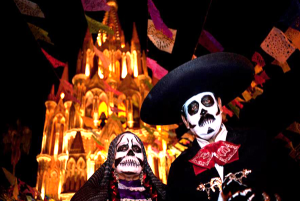The city of San Miguel de Allende, known as the Heart of Mexico, will hold the third annual La Calaca festival along with the Day of the Dead celebration, a popular tradition steaming back to the colonial era, combining pre-Hispanic with European festivities surrounding the revisiting of those loved ones who have passed.
This UNESCO recognized festivity as an Intangible Heritage is transformed in La Calaca Festival through the eyes of innovative artistic expressions by national and international artists. The four day event, starts on October 31st (the same day that Halloween is celebrated in the US) and continues through November 1st (All Saints Day), November 2nd, which is the Day of the Dead for Catholics, and ending on November 3rd. (Calaca is a colloquial Mexican Spanish name for skeleton or skull).
In the daytime, participants are immersed in cultural activities such as tours of traditional altars and cemeteries, live art installations and creative workshops.
At night, the city comes alive with costumed processions, musical performances, and parties that last till sunrise.
“La Calaca Festival is a perfect combination of traditional Mexico and the cosmopolitism that San Miguel de Allende evokes,” said Maria José Garrido, Director of Tourism and Economic Development of San Miguel de Allende. “During the four days of festivities, you can enjoy innovative performances, exhibitions and music inspired in an eclectic concept as the dead are, but in a festive way, and at the same time enjoy outstanding accommodations and gourmet food “.
The city’s tourism infrastructure comes together in this celebration, offering hotel discounts and packages as well as special menus at restaurants.
San Miguel de Allende has more than 80 hotels, two of them Virtuoso members and one Design Hotel, plus 30 boutique hotels; around 70 international gastronomy restaurants and Mexican cuisine; 3 golf courses and several spas and art galleries.
In 2013, it was recognized as the best city in the world, by the Condé Nast Traveler magazine, and in 2008 it was named a Cultural Heritage city by UNESCO.
La Calaca Festival, www.lacalacafestival.org

